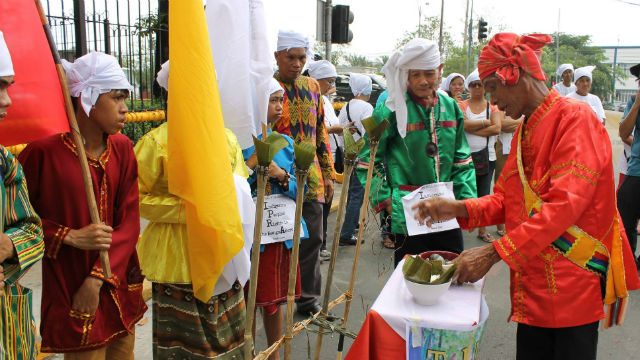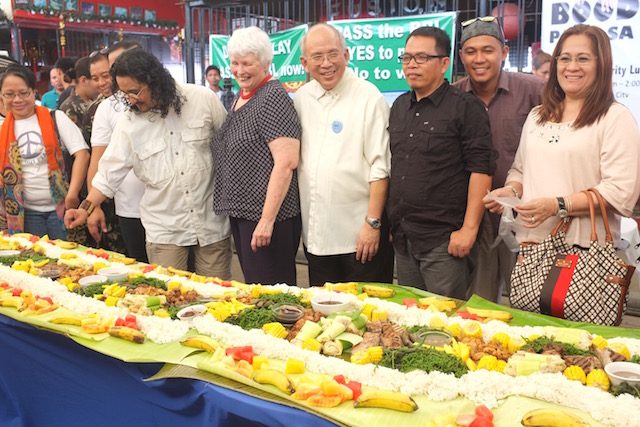SUMMARY
This is AI generated summarization, which may have errors. For context, always refer to the full article.

MANILA, Philippines – Chants and sounds of gongs filled the air as indigenous peoples (IP) from Mindanao performed a ritual at the gates of the House of Representatives on Sunday, May 10.
According to indigenous leaders from Mindanao, the ritual – called Tulak Bungkas Itungan (ritual for enlightenment) sought to pray for the House of Representatives panel that was set to vote on the proposed Bangsamoro Basic Law (BBL) on Monday, May 11. The scheduled voting was delayed after leaders of the Lower House agreed to move the proceedings to Monday, May 18.
Traditional items used to call for “divine intervention for discernment” on the BBL: dulang (altar); ranga, a storage place for the offering to God; afaran, a storage place of sacred stones; and the gito or rattan rope which symbolically tied up the group’s call.
“We hope that the spirits will open and bless the minds and hearts of the members of the Congress as they deliberate the draft BBL,” said Abay Rendaw Mosela, a Teduray kemamal keadan (supreme spiritual leader) who led the ritual.
Flags were also raised and waived throughout the ritual. The yellow flag stood for wisdom, authority, and power; the white one for purity, peace, healthy mind, and body. The red flag symbolized blood that sustains life of all living being. The green one symbolized nature and other living creatures on Earth while the blue represented the sky and heavenly bodies.
Threat to ancestral lands and culture?
Lumad leaders from tribes like the Teduray, Lambangian, Dulangan-Manobo, and Erumanen ne Menuvu said their voice is not being heard in discussions on the proposed BBL. They fear the measure will threaten their ancestral lands and indigenous culture.
Teduray tribe leader Timuay Alim Bandara said the committee should consider the issues and concerns raised by the Lumads, the indigenous peoples in Mindanao.
“The panel has failed us and now we hope the Congress will be enlightened to hear our voices and pass a BBL that is truly inclusive and just,” Bandara said.
The proposed Bangsamoro law “recognizes, promotes and protects the rights” of the Lumad in Mindanao, but does not mention the Indigenous Peoples’ Rights Act (IPRA), indigenous leaders said. IPRA is a law passed in 1997 that has yet to be implemented in the Autonomous Region in Muslim Mindanao (ARMM).
Datu Roldan Babelon of the Erumanen ne Menuvu tribe earlier told Rappler ancestral lands will be threatened by the the BBL if the measure does not explicitly recognize their collective ownership over their land and natural resources. (READ: Rappler Talk: Are the Lumad victims in war and peace?)
The indigenous leaders also felt the BBL is vague about how it will recognize the identity of the non-Moro IPs in Mindanao. Non-Moro IPs are those who have not identified themselves as members of the Bangsamoro, they said.
“Our identities are different…We practice different lifestyles,” Timuay Santos Unsad of the Teduray tribe told Rappler.

Cultural and religious treasures
Meanwhile, on Monday, other groups gathered in different places across the country to rally behind the proposed BBL.
Sharing a boodle meal of seafood, vegetables and fruits served on banana leaves, religious leaders, peace advocates, students, and military officials gathered together in Davao City to express their unity for peace in Mindanao.
Ateneo de Davao University president Fr Joel Tabora SJ said the gathering is an attempt to echo the sound of peace in Mindanao. Tabora added that one of the challenges for the people of Mindanao and the entire country is to “search for cultural and religious treasures that bind everyone together.”
As legislators decide on the fate of the BBL, Tabora urged the people and the leaders of the country to go through the same path that leads toward the transformation of the conflict in the region.
“As we call for the passage of this law we call on you to work together,” Tabora said, stressing that the BBL offers an opportunity to rebuild broken ties and trust. – With reports from Karlos Manlupig/Rappler.com
Add a comment
How does this make you feel?
There are no comments yet. Add your comment to start the conversation.